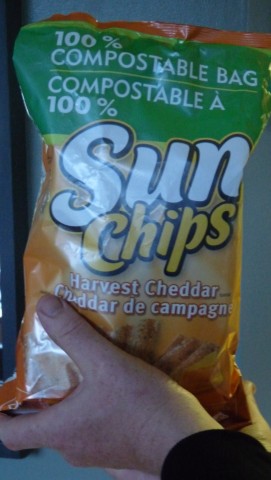OP/ED: Compostible plastics could be a sweet ending to environmental concerns
I went to the local Shell the other day for snacks, yes it was a late night munchy attack, and as I was perusing the shelves for the appropriate chip a label on a bag jumped up to catch my eye – 100% compostable bag. I was so excited I had to buy it! Good thing it was a chip I like – Sun Chips.
Recently I have been having some serious misgivings about our efforts in reducing plastics in our landfills. I bought myself several grocery type fabric bags to minimize the plastic I bring into the house. But then I find myself turning around and purchasing plastic bags to put my garbage into. You see, I used to recycle the bags from the groceries for garbage, but now I don’t have them anymore.
More and more the grocery stores, and other retailers, have been discouraging use of plastic, and rightfully so. Most still issue bags if needed, but some are charging per bag to discourage our use of them. Recycling of the bags is possible, but we are still using the bags that are made from non-renewable petroleum products. Pharmasave, for example, has taken another tack and offers 100% biodegradable bags that are also recyclable. Nice combination, but what does biodegradable really mean?
According to the Biodegradable Products Institute (BPI), the phrase biodegradable, like recyclable, merely describes the composition of a product – its potential, not its inherent value. If a product is sent to a landfill, and not disposed of properly in a municipal composting or recycling facility, it is still part of the problem no matter what it’s made from.
The BPI goes on to explain that most landfills are actually designed to be dry and oxygen-poor conditions that cause organic matter to mummify rather than decompose. This fact is actually preferred since uncontrolled biodegradation in a landfill can cause ground water pollution, methane gas emissions, and unstable sub-soil conditions. As a result, modern landfills are kept dry and air-tight to prevent biodegradation.
So what would happen to Pharamasave’s bag? Well, their information says it will decay in nine months to five years dependent on conditions. It is biodegradable including the ink, but many of the experts are saying that, with landfill conditions, it’s more like the five year scenario.
BPI on the other hand is supporting the development of compostable products since they claim that the true biodegradation is composting – the process of controlled biodegradation outside a landfill.
By carefully controlling the feedstocks (source-separated, mixed organics), and controlling the process (moisture content, oxygen levels), composters transform biogegradable materials into useful products that are used in farming, gardening and soil conservation. Today, despite national progress on yard waste composting, millions of tons of biodegradable materials (food scraps, wet & soiled paper, leaves and grass) are still being sent to landfills where they will sit in an airless, dry environment to be mummified.
It appears that we should be moving to compostable products, not just biodegradable. Rather than focusing on “biodegradability”, the BPI and its members strongly believe that manufacturers, consumers and communities should be looking for solutions to solid waste issues that encompass source reduction, reuse and greater use of recycling and composting, all of which divert materials from landfills and incinerators.
Again the problem really needs to be put back on the source – why can’t manufacturers use materials that are biodegradable or compostable? When I buy my garbage bags now, in 2010, why are they still the old style bags? If we stop accepting the environmentally unfriendly products would the message get through?
But back to my Sun Chips – this manufacturer gets it. Their bags will fully compost in about 14 weeks when placed in a hot, active compost pile or bin. (However, actual results may vary, depending on the conditions of the compost pile or bin – always need a good disclaimer.) It’s made from 90% renewable plant based materials – another bonus. And they are certified by, you guessed it, the BPI.
In an article by Science Daily, information on new options for packaging based on polymers indicates that food packaging and other disposable plastic items could soon be composted at home along with organic waste, thanks to a new sugar-based polymer made from sugars which come from non-food crops such as fast-growing trees and grasses, or renewable biomass from agricultural or food waste.
It is being developed at Imperial College London by a team of Engineering and Physical Sciences Research Council scientists led by Dr. Charlotte Williams. The search for greener plastics, especially for single use items such as food packaging, is the subject of significant research worldwide. Around 7% of worldwide oil and gas resources are consumed in plastics manufacture, with worldwide production exceeding 150 million tons per year. Almost 99% of plastics are formed from fossil fuels.
How do we change our carbon footprint and reduce reliance on oil? Let’s push for changes from the source – the manufacturers of plastics. We can reduce our volumes with less use, but the real solution comes from truly biodegradable options. With plastics already successfully banned in large cities around the world – San Francisco, and Paris (and soon all of France) – could the Boundary be next??






















